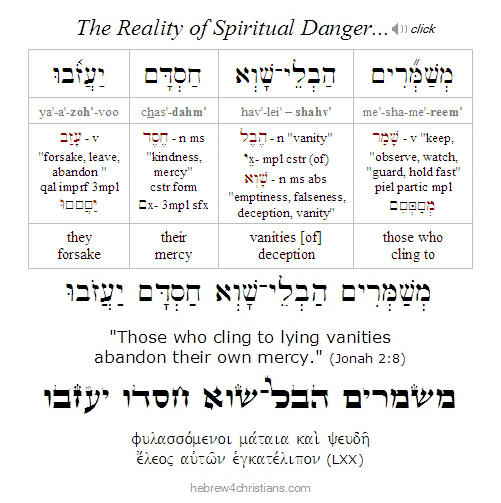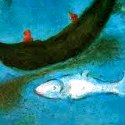|
During the afternoon service of Yom Kippur, the Book of Jonah is recited to awaken the heart to "Arise, call out to your God" (1:6). Like Jonah we first must be "swallowed up" in consciousness of our own rebellion before we realize we are undone, that we are without remedy apart from God's direct intervention and deliverance. We start there - in the "belly of the fish" - and later are resurrected to go forth by God's mercy and grace. Likewise we first see ourselves as undone and go to the cross, finding pardon and given the power of the ruach HaKodesh to live unto God according to the truth. But note that the imperatives of the New Testament are directed to the new nature given to us by God, and not to the old nature that has been crucified and done away. We are admonished to live in accordance with the truth of what God has done for us through the Moshia', the Savior. You are a new creation, therefore be who you are in the Messiah!
It is noteworthy that Yeshua mentioned the "sign of Jonah the prophet," that is, Jonah's miraculous deliverance after being entombed in the belly of the fish for three days, to authenticate his own claim to be Israel's Redeemer. "Just as Jonah was three days and three nights in the belly of the great fish, so will the Son of Man be three days and three nights in the belly of the earth" (Matt. 12:40). "This is an evil generation. It seeks a sign, and no sign will be given to it except the sign of Jonah the prophet (ΧΧΦΉΧͺ ΧΧΦΉΧ ΦΈΧ ΧΦ·Χ ΦΌΦΈΧΦ΄ΧΧ). For as Jonah became a sign to the Ninevites, so also the Son of Man will be to this generation" (Luke 11:29-30). In other words, the story of Jonah foreshadowed the atoning sacrifice of the Messiah, that is, his death, burial and especially his miraculous resurrection on the third day. Just as God brought Jonah back to life after three days in the belly of the earth, so the resurrection of Yeshua from the dead would vindicate his claim to be the Savior and Redeemer of the world. In this way the "Sign of Jonah" and the sacrificial and atoning work of Yeshua as our High Priest of the new covenant are connected.
"We we were so utterly burdened beyond our strength that we despaired of life itself, yes, we felt that we had received the sentence of death; but that was to make us rely not on ourselves, but on God who raises the dead" (2 Cor 1:8-9). This marks the end of carnal hope, when we realize we are but "dead men walking," and from this extremity of inner desperation and clarity we learn to rely solely on God for what we need. Here we abandon ourselves to God's care, despite the despair, darkness, and fear. We rely on "God who raises the dead," because all other remedies have been vanquished. It is a great gift to be so afflicted, for these "troubles of love" teach us to trust God alone for all we need. The only way out is through. We don't seek an easy way of life, but only that the LORD our God be with us throughout our troubles...
Hebrew Lesson
Jonah 2:8 reading with comments:
 |
"There appear to be many people who chose to go crazy (or become alcoholics, addicts, criminals, suicides) rather than have to bear the pain and ambiguity of a life situation that they have decided that they cannot stand" (Sheldon Kopp). Like Jonah we first must be "swallowed up" in the consciousness that we are undone and without remedy apart from God's direct intervention and deliverance. Χ’ΦΈΧ§Χ ΧΦ·ΧΦΌΦ΅Χ ΧΦ΄ΧΦΌΧ ΧΦ°ΧΦΈΧ Φ»Χ©Χ ΧΧΦΌΧ ΧΦ΄Χ ΧΦ΅ΧΦΈΧ’ΦΆΧ ΦΌΧ (Jer. 17:9). We start there - in the "belly of the fish" - and later are resurrected to go forth by God's mercy and grace. Likewise we first see ourselves as dying and go to the cross, finding pardon and given the power of the ruach HaKodesh to live unto God according to the truth.
|


